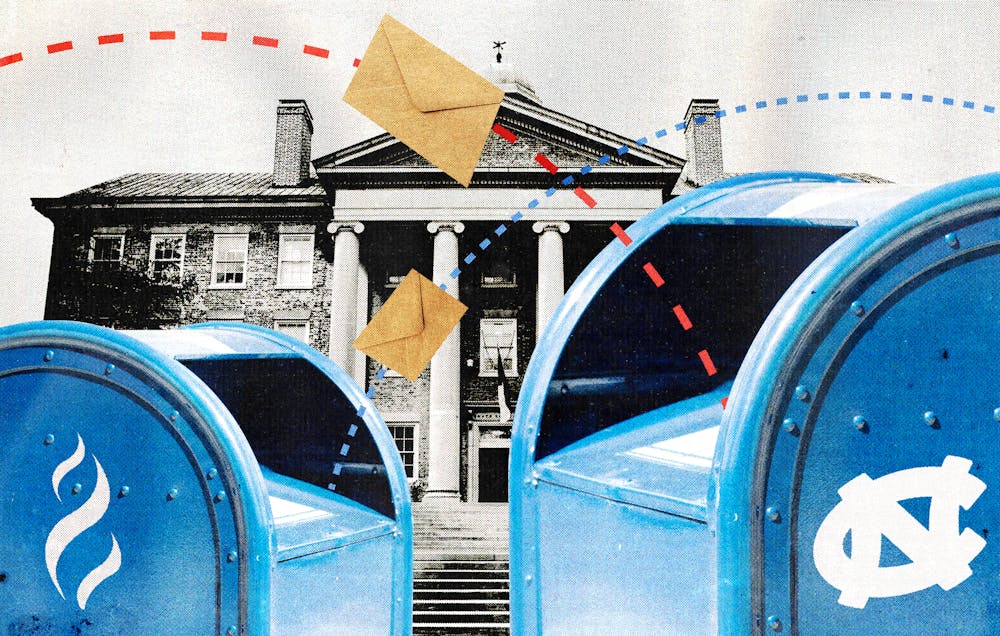Wheelan said SACSCOC works as a “housekeeping seal of approval” — an entity to assure educational quality and to evaluate universities.
The agency’s accreditation is also required for students at a university to receive federal financial aid.
According to Wheelan, there are four main ways to incur attention from SACSCOC: a university could self-report an issue, a formal complaint could be filed, there could be a clear reaffirmation process or the university could receive significant media coverage.
Her inquiry letter cited coverage from The Wall Street Journal Editorial Board and The Washington Post as reasons SACSCOC questioned UNC's compliance with their Principles of Accreditation.
“And without standards, curriculum decisions usually come from the faculty,” Wheelan said. “And when you see an article that says the faculty didn’t know anything about it, then we ask what’s going on.”
The request asked the University to prepare a report explaining the extent of the UNC's compliance with two of the SACSCOC's standards. The standards include ensuring that university governance has a clear distinction between its policy-making function from the administration and the enforcement of those policies, and the university respects the faculty's role in curricula development and implementation.
Wheelan said the inquiry was purely a letter requesting information to support compliance of SACSCOC's standards.
SACSCOC sends at least 20 similar letters to universities in the Southeast every year, she said.
Wheelan faces national response
After sending the accreditation inquiry, Wheelan received her own letter on March 1 from North Carolina Republicans in Congress.
The letter expressed concerns over Wheelan’s decision to mention her concerns about UNC's accreditation at the Feb. 7 meeting prior to officially sending the SACSCOC letter to the chancellor.
“As members of the North Carolina congressional delegation, we expect accreditors not to prejudge actions of governing boards, follow normal processes, be attentive to such matters of public importance, and act in accord with federal and state law,” the letter said.
To get the day's news and headlines in your inbox each morning, sign up for our email newsletters.
The conclusion of the letter asked Wheelan to clarify her evidence in sending the accreditation inquiry.
Rep. Virginia Foxx (R-N.C. 5), chairperson of the U.S. House Committee on Education and the Workforce, penned the letter with signatures from seven Republican Congress members.
“I was taken aback by the letter, having not received one previously, and by the fact the chair of the House Education Committee, who was the first signature, has my cell phone number and, in the past, has called me about issues,” Wheelan said.
She said she responded to the congressional letter and did not hear any more from them after. She declined to provide a copy of her response.
Wheelan also added she had “no comment on the politics of anything.”
Rep. Valerie Foushee (D-N.C. 4), who represents Chapel Hill, did not sign the inquiry letter. She said in a statement that she wishes there had been more transparency in the development of the School.
Foxx and Spellings did not respond to requests for comment.
Chancellor Guskiewicz responds to the inquiry
Chancellor Kevin Guskiewicz responded to SACSCOC’s accreditation inquiry on March 17 and Wheelan said the request has since been absolved.
In a response that was obtained by The Daily Tar Heel, Guskiewicz said that the University will not make a decision without input from the faculty.
“UNC-Chapel Hill will make no decision about the proposed curriculum expansion (e.g. a potential School of Civic Life and Leadership) without due diligence and proper planning alongside deans and faculty," the letter said. "During that thoughtful and thorough process, we will continue to update the Board of Trustees, as well as our faculty leaders and other interested stakeholders.”
“The University has adequately responded to our concerns,” Wheelan said. “And we have found that, because of their response, they are in compliance with our standards. And so the issue is closed.”
Chairperson of the Board of Trustees David Boliek, Vice Chairperson John Preyer and trustee Perrin Jones all declined to comment on the accreditation inquiry until the chancellor makes a public statement.
“The Chancellor is responding to this request in his official capacity, and I’ll wait to see it before commenting,” Preyer said in a March 19 email to The Daily Tar Heel. The chancellor sent his letter earlier that week.
Faculty remain concerned
Mimi Chapman, chairperson of the faculty, said she would’ve liked to have seen more communication about the inquiry publicly or with faculty leadership.
Chapman said the faculty believed that there would be no curricular offerings related to the Program for Public Discourse at the time SCiLL was proposed.
Chapman said there is a degree of clarification that is necessary to the conversations surrounding the School and the Program for Public Discourse.
When asked if she agreed with the chancellor characterizing the development of the School as thoughtful and thorough, Chapman said, “I’m hopeful that it will become so, and I think I’ll leave it at that.”
@abbypenderr
university@dailytarheel.com



